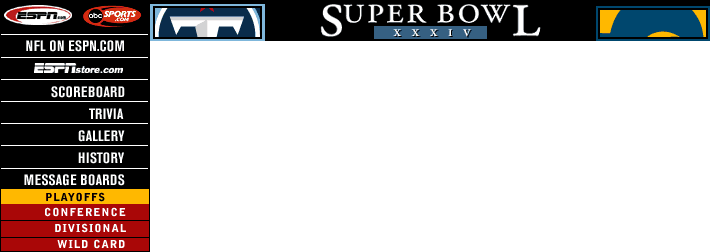ATLANTA -- In trying to build the St. Louis Rams, Dick Vermeil took the Super Bowl participants from the last 10 years and prepared a statistical profile of what it takes to get to the NFL championship game.
|  |
|
| Expect to see plenty of screen passes to Marshall Faulk. |
The one thing that jumped out at Vermeil was that his team had to score points. The Rams had to be explosive on offense, averaging at least 24.5 points -- not including defense or special-teams scoring -- to get to the Super Bowl. He built the Rams with that in mind, a philosophy of speed and explosiveness. And he has used that philosophy to build a team that plays on the carpet at the TWA Dome.
Vermeil ended up with a team that creates matchup problems. Offensively, the Rams like to score early and quickly. They are not a team that likes to sustain offense. When they get a favorable matchup, the Rams don't go for the five-yard pass. They look for the big play.
Their offensive philosophy then contributes to the defensive philosophy. When the offense scores early, the other team's offense becomes one-dimensional. The defense plays well in more known passing situations, making it even more effective. Like the offense, the Rams defense is built around speed and quickness.
Looking at the Rams' special teams, coach Frank Gansz has them disciplined and well-coached. He also has great speed with punt returner Az-Zahir Hakim and kick returner Tony Horne.
When offensive coordinator Mike Martz and defensive coordinator John Bunting break down the game plan, it always starts with putting St. Louis players in favorable matchups. Because they have already played Tennessee, the coaches will see not only scheme matchups from the first game, but also individual matchups. The team that does the best job of making corrections from that game will be the team that wins.
Even though their last meeting was three months ago, the Rams will concentrate heavily on that game. Both teams will stick with their philosophies; they aren't teams that change their game plans each week based on their opponent. They like to force the opponent to play their style of football.
In the first game, the Titans played more zone defense than at any time this season. They have a predominantly man-to-man defense that likes to use pressure up front. Because the Titans led 21-0 after the first quarter, the score had something to do with their change in approach. But when the game got closer near the end, the Titans returned to their philosophy of bringing pressure.
If Tennessee sticks with its basic philosophy, the Rams will have opportunities to get single coverage. In hindsight, looking at the tape and talking to Martz about the Tampa Bay game, the Rams were upset they didn't work the perimeter more. Tampa Bay did a good job with safety John Lynch of taking away their short crossing routes and playing to the inside. In this game, the Rams will want to try to exploit the cornerbacks, Denard Walker and Samari Rolle.
Another critical player is Anthony Dorsett. Marcus Robertson has been at free safety all season, and now the Titans have to play someone who hasn't played as much. That creates a lot of pressure on Dorsett because the Rams use a lot of formation variation, motions and personnel packages. Whenever there is motion, the secondary must adjust and get in the right coverage. When there is an inexperienced player in the secondary like Dorsett, the Rams will try to exploit that.
The Rams will do what they do well, but more importantly they are trying to create favorable matchups. For instance, against Minnesota, the Vikings had Antonio Bass, not a fast player, at free safety. On the first two plays of the game, the Rams ran post patterns right at Bass. Both receivers were open. Torry Holt was open, as was Isaac Bruce, who caught his for a 77-yard touchdown. If the Titans have a weakness, the Rams will test it.
There have been games in which I thought Martz would probe the defense a bit. In one game, the Rams ran 15 different formations in their first 15 plays. In another game, the Rams ran 23 different formations in the first 23 plays. At times, they will probe. But once they get what they want, and something they like, they will attack.
The Rams have everything in their playbook active every week. I have discussed the game plan with Vermeil, who said that they could play for three weeks straight and not get everything in the game. It's not like they have 20 plays for each game. They have hundreds of plays they can use. Vermeil speaks highly of his players' intelligence and the hard work his coaching staff does to prepare the players for the game. There have been times the Rams have dug deep into the bottom of the play barrel, and Vermeil said the players have responded.
Here is what the Rams will try to do against the Titans in their Super Bowl game plan:
Offense
1. Exploit the outside: The Rams will try to attack the outside. The receivers will see single coverage against Walker and Rolle. Meanwhile, the Titans will keep their safeties and linebackers inside. They have great confidence in Walker and Rolle, but the Rams also have great confidence in their receivers -- Isaac Bruce, Torry Holt, Hakim and Ricky Proehl.
With Robertson out, Dorsett is now the free safety. More importantly, though, it brings the Titans further down in their pecking order of defensive backs. In nickel and dime packages, their Nos. 5 and 6 defensive backs are playing. The Rams have the advantage the deeper the Titans must go on their depth chart.
2. Run the football: The Rams will be a little out of character from what we expect and try to run the football a little bit more to get better balance in their offense. Because of players like Jevon Kearse and Kenny Holmes, who are excellent at rushing the passer, the Rams will try to wear them out.
In the Rams-Titans game earlier this season, the St. Louis coaching staff was disappointed they didn't run at Kearse enough. As they fell behind, it turned into a long afternoon for right tackle Fred Miller. Against the Titans, the Rams used a formation in which they lined up with tight end Roland Williams at left tackle.
They then brought Orlando Pace over to play tight end on the right side next to Fred Miller. They call it their "elephant" formation and ran it twice, gaining about 10 yards each time. Unfortunately, the game dictated that they couldn't run the ball that much. Pace might not end up running a post pattern, but that is a formation variation they might use to match up in the running game Sunday.
3. Spread 'em out: The Titans do a lot of different things with their 46 defense, which includes playing eight men in the box. Strong safety Blaine Bishop is clearly a player the Rams have to account for. They didn't do a good job last week of making the Bucs' Lynch accountable.
The Rams will need to do a better job of dictating the game to Bishop, or he will cause problems for them. But I think the Rams will spread the field, make the Titans dictate their coverages, and then attack. The Titans defense is really the antithesis of what the Bucs were last week. The Bucs are a high-percentage zone team that doesn't blitz much. They blitzed only twice against the Rams, and one came on the touchdown pass to Proehl.
To a certain degree, the Titans' style plays into the Rams hands. In man-to-man, if someone misses a tackle, there are chances for yards after the catch. People think that because the Rams gain a lot of passing yards down the field because they throw the ball deep, but that's not true. They throw the ball short, Kurt Warner is a very accurate quarterback, and the receivers and Marshall Faulk get yards after the catch.
Defense
1. Fearsome front seven: The Rams' front seven must go to work. They have to stop Eddie George and the power running game, maintaining their gap discipline. The defensive tackles need to hold the point of attack and create penetration to get to the backfield.
If George gets his motor running, he is tough to stop. So the Rams will use stunts, slants and swipes -- when they bring the linebackers off the tail of the tackles and try to penetrate. That will be the foundation of their defense: getting through the line of scrimmage. The Rams must use their speed and quickness because the Titans offensive line is big and strong.
2. Mush rush on McNair: McNair is not the typical scrambling quarterback. When he runs, he becomes a running back. The end of the run is usually a collision rather than a slide. That makes him a very dangerous quarterback. The Rams need to maintain the integrity of their pass rush.
They must mush rush, slowly plodding up the field and not giving him any gaps. The Titans do a great job of using McNair on designed runs: draws, rollouts and sprint-outs. Bunting must be careful that his linebackers maintain a disciplined approach to their area of the field so they don't allow him to get to the outside.
3. Robber approach: Defensively, the Rams are almost a mirror image of the Titans. They are an aggressive, man-to-man, attack-the-quarterback defense. By playing man-to-man against a running quarterback, the Rams run into a problem; if McNair breaks the pocket, there is nobody to account for him.
The Rams will call more "lurk" or "robber" -- bringing the safety to the middle of the field to play in pass coverage. He won't be a spy, but he will be aware of McNair's running ability.
ESPN's Ron Jaworski has analyzed matchups all season for ESPN.com.



 Dick Vermeil believes the Rams have an advantage.
Dick Vermeil believes the Rams have an advantage.